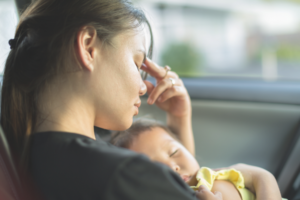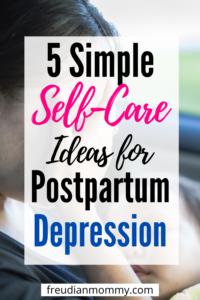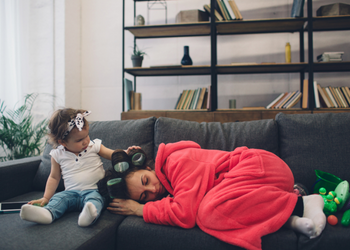Easy Postpartum Depression Self-Care Ideas For Struggling Moms
A mother experiences a range of emotions after childbirth. She may feel overwhelming joy, happiness, and contentment when she holds her baby for the first time at the hospital. She may also experience anxiety and fear regarding her ability to care for her baby once she is home, this is especially true if the mother lacks a supportive community.
The first 2-3 months in the first year of your baby’s life are as demanding and challenging as it gets. The never-ending breastfeeding and the constant checking to make sure your baby is safe, comfortable, and adjusting to the outside world okay can cause mothers to feel tired and overwhelmed.
Also read: Why It Takes A Village To Raise A Child
Many mothers also experience mood swings, feeling anxious, overwhelmed, irritable, restless, having difficulty eating and sleeping, and crying. These feelings are known as baby blues.
Baby blues typically begin 2-3 days after giving birth and affect roughly 80 percent of mothers. Those feelings are all common and lessen over time, lasting 1-2 weeks.
What is not normal is when those feelings don’t get better. If your feelings heighten to that of worthlessness, and hopelessness, and interferes with your day-to-day functioning, you could be struggling with postpartum depression.

What is postpartum depression?
Postpartum depression is a type of depression that affects mothers after giving birth. It begins within the first 1-3 weeks after childbirth but can happen up to a year after delivery. Postpartum depression affects 10-15 percent of mothers. This type of depression not only makes it hard to care for your baby, but it also makes it a chore to care for yourself.
The cause of postpartum depression
Postpartum depression is connected to the hormonal changes that occur after childbirth. The female hormones estrogen and progesterone increase tenfold when a woman is pregnant. However, after giving birth, a quick drop in the levels of estrogen and progesterone takes place. And three days post childbirth, a woman’s estrogen and progesterone return to how they were before pregnancy.
Although the link between the hormonal drop and postpartum depression after childbirth requires more investigation, researchers acknowledge that this sudden hormonal drop leads to changes in your brain, causing mood changes.
Also read: 18 Best Postpartum Must Haves For Your Postpartum Care Kit
Signs and symptoms of postpartum depression
Keep an eye out for these signs and symptoms of postpartum depression:
- Depressed mood
- Feeling extreme sadness, worthless, hopeless, guilty, scared, or alone
- Frequent crying
- Changes in your appetite or difficulty eating
- Changes in sleeping patterns (sleeping too much or trouble sleeping)
- Lost of interest in your favorite activities
- Excessive worrying
- Feel anxious or have panic attacks
- Difficulty thinking, concentrating, focusing, or making decisions
- Trouble coping with everyday situations
- Loss of energy or motivation
- Lack of interest in your baby
- Not bonding with your baby or feeling like you don’t want your baby
- Thoughts of hurting yourself or your baby
- Recurrent thoughts of death or suicide
If you experience any of these symptoms most of the day, nearly every day for at least 2 weeks straight, please reach out to your healthcare provider.
Treatment for postpartum depression
Postpartum depression can be harmful to you and your baby if it goes untreated. Here are a few of the common ways postpartum depression may be treated.

Psychotherapy: Postpartum depression can be treated with talk therapy. Talk therapy uses cognitive behavior therapy to help you come up with ways to cope with and manage the symptoms of postpartum depression. It is also helpful to be able to talk about your worries as a mom in a judgment-free zone.
Medication: Depending on the severity of your postpartum depression, an antidepressant such as a selective serotonin reuptake inhibitors (SSRIs), or Serotonin and norepinephrine reuptake inhibitors (SNRIs) may be used to help better manage your symptoms.
Medication can be passed on to your baby if you are breastfeeding, and although many antidepressants are generally safe, definitely talk to your healthcare provider about the risks.
If your healthcare provider does decide to go the medication route, keep in mind that medication may take up to a few weeks to work, don’t be discouraged and keep at it. Continue to express any concerns you have with your provider.
A combination of therapy and medication may be used for the best results.
A support group: Joining a support group lets you know that you are not alone and have people who are facing the same challenge.
Supplemental groups: Additional groups such as exercise, meditation, or yoga groups may also contribute to improving your mood.
5 Postpartum Depression Self-Care Ideas for Struggling Moms
Lifestyle modifications can truly help you to improve and better manage the symptoms of postpartum depression. As busy as you are with a new baby, find the time to engage in these easy postpartum depression self-care ideas to ensure your well-being is not being neglected.
Prioritize sleep: Sleeping is the first postpartum depression self-care idea. You don’t have to get 10 hours of sleep, but you do have to make sure that you get enough sleep. Lack of sleep is common when you have a newborn, which can worsen symptoms of depression. Sleep should be a priority. I know you’ve heard the common advice to sleep when the baby sleeps, but this advice is especially true when you struggle with postpartum depression. Everything else can wait.
Eat a healthy diet: A lot of people don’t take nutrition into consideration when recovering from childbirth. But the fact is, nutrition plays a significant role in recovering and healing from childbirth, particularly in hormonal regulation. Specific nutrients are needed postpartum and lacking these nutrients may put you at a higher risk of developing postpartum depression without proper nutrition.
Take 10-15 minute walks: Exercise can reduce the symptoms of postpartum depression and improve your mood. Start slowly by taking 10-15 minute walks every day.
Ask for help: Caring for a newborn alone can become overwhelming and doesn’t give you enough time to take care of yourself. It’s okay to ask for help. Asking for help is not an act of weakness. Communicate to those around you how they can help you care for your baby to give you time to get some rest and take care of yourself.
Join a mommy group: The final postpartum depression self-care idea is to join a mommy group. Joining a mommy group can be an empowering way to combat postpartum depression. Being surrounded by other moms who may be going through the same thing takes the guilt and shame you may be feeling away. It also helps to have people you can talk to about your concerns as a mom.
Final words on Postpartum Depression Self-Care Ideas for Struggling Moms
Postpartum depression is not your fault, but some factors do put you at greater risk for developing this type of depression. Factors such as a person or family history of depression, health, and pregnancy complications, having a baby who cries a lot, conflict in your marriage, or not enough support may all increase your chances of postpartum depression.
Try to be proactive about knowing and reaching out for help when you recognize that something is off in the way that you are feeling and thinking.
5 Simple Postpartum Depression Self-Care Ideas for Struggling Moms













